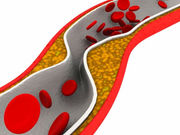Findings for patients with recent ischemic stroke/TIA and insulin resistance, but no history of diabetes
FRIDAY, Aug. 5, 2016 (HealthDay News) — For insulin-resistant patients with recent ischemic stroke or transient ischemic attack, pioglitazone is associated with reduced risk of diabetes, according to a study published online July 27 in Diabetes Care.
Silvio E. Inzucchi, M.D., from the Yale School of Medicine in New Haven, Conn., and colleagues examined the metabolic effects of pioglitazone and diabetes prevention in a trial involving 3,876 patients with recent ischemic stroke or transient ischemic attack, no history of diabetes, fasting plasma glucose (FPG) <126 mg/dL, and insulin resistance by homeostasis model assessment of insulin resistance (HOMA-IR) score >3.0. Participants were randomized to receive pioglitazone or placebo.
The researchers found that the mean HOMA-IR and FPG decreased in the pioglitazone group and increased in the placebo group (all P < 0.0001) after one year. Diabetes developed in 3.8 and 7.7 percent of participants in the pioglitazone and placebo groups, respectively, over a median follow-up of 4.8 years (hazard ratio, 0.48). This effect was mainly driven by those with initial impaired fasting glucose or elevated hemoglobin A1c (hazard ratios, 0.41 and 0.46, respectively).
“Pioglitazone is the first medication shown to prevent both progression to diabetes and major cardiovascular events as prespecified outcomes in a single trial,” the authors write.
Several authors disclosed financial ties to pharmaceutical companies, including Takeda Pharmaceuticals, which provided pioglitazone and placebo.
Full Text (subscription or payment may be required)
Copyright © 2016 HealthDay. All rights reserved.








